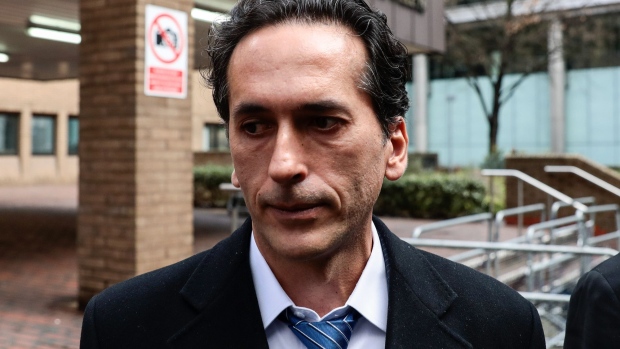Sep 24, 2020
Ex-Barclays Trader Guilty of Rate Rigging Faces Extradition
, Bloomberg News

(Bloomberg) -- A former Barclays Plc trader who fled to France before he was convicted of helping to rig a key benchmark is facing extradition proceedings that could lead to him being sent to the U.K. to serve his sentence.
The status of Philippe Moryoussef, who was found guilty in 2018 of conspiracy to manipulate the Euro Interbank Offered Rate, is scheduled for an extradition hearing in Paris next week. He was sentenced in absentia to eight years in prison after fleeing London days before the trial began.
The 52-year-old is one of several bankers convicted of rigging Euribor at a pair of trials brought by the U.K. Serious Fraud Office. Moryoussef’s friend, ex-Deutsche Bank AG trader Christian Bittar, pleaded guilty while two other Barclays traders were convicted by a jury in 2019.
The rigging of Euribor and another rate, Libor, by traders seeking to bolster their positions were among the most high-profile crimes prosecuted in the wake of the 2008 financial crisis. The benchmarks are tied to trillions of dollars worth of loans and derivatives.
Moryoussef’s lawyer didn’t respond to two calls and an email seeking comment. He said shortly before the start of the 2018 trial that he feared the U.K. proceedings wouldn’t be fair.
The SFO declined to comment.
Next week’s hearing is the sixth in Moryoussef’s extradition proceedings, a Paris court official said. If the person sought does not consent to the extradition request it isn’t unusual to have several hearings months apart, especially if there are requests for additional information.
Brexit Deadline
The SFO faces a number of hurdles, including France’s reluctance to extradite its own citizens and the fast-approaching Dec. 31 date when the U.K. ends the transition period to fully exit the European Union.
France refuses to extradite its citizens to non-European Union countries. Still there is a provision in the Brexit withdrawal agreement, which says European Arrest Warrants can be executed after the transition date, if the person has been arrested before then.
The question is whether the provision of the withdrawal agreement trumps the tradional ban France has on extraditing its own citizens, according to Nick Vamos, who led the U.K. Crown Prosecution Service’s extradition team for four years.
January 2021 could be “an absolute guillotine in terms of being able to extradite him,” he said.
U.K. law enforcement is working on finding new ways of working with its European partners post-Brexit. If his extradition is refused on the basis of nationality, France could be under an obligation to consider enforcing the sentence itself, Vamos said.
Read More: Moryoussef Said Bittar’s Plea Spurred Flight From London
Bittar, whose guilty plea triggered Moryoussef’s decision to abscond, was sentenced to five years, four months in prison. In a 2018 interview from Paris, before he was convicted, Moryoussef lamented his friend’s decision.
“We used to speak together three hours a day for years, but he never told me,” Moryoussef said of Bittar. “We’d been fighting this case together until then.” Speaking through his lawyer, Bittar disputed that he spoke with Moryoussef or that they fought the case together.
Carlo Palombo and Colin Bermingham, who worked at Barclays, were convicted last year and sentenced to four and five years respectively. The rest of SFO’s Euribor probe was closed in June after the authorities withdrew arrest warrants for four other traders it had sought to prosecute.
The decision was made after French and German courts refused to extradite Joerg Vogt, Ardalan Gharagozlou, Kai-Uwe Kappauf and Stephane Esper, former bankers at Deutsche Bank AG and Société Générale SA.
Only Moryoussef was tried in absentia, because he had appeared at hearings early on and heard the charges against him.
(Updates with details of Brexit ramifications, 2018 conviction from eighth paragraph)
©2020 Bloomberg L.P.